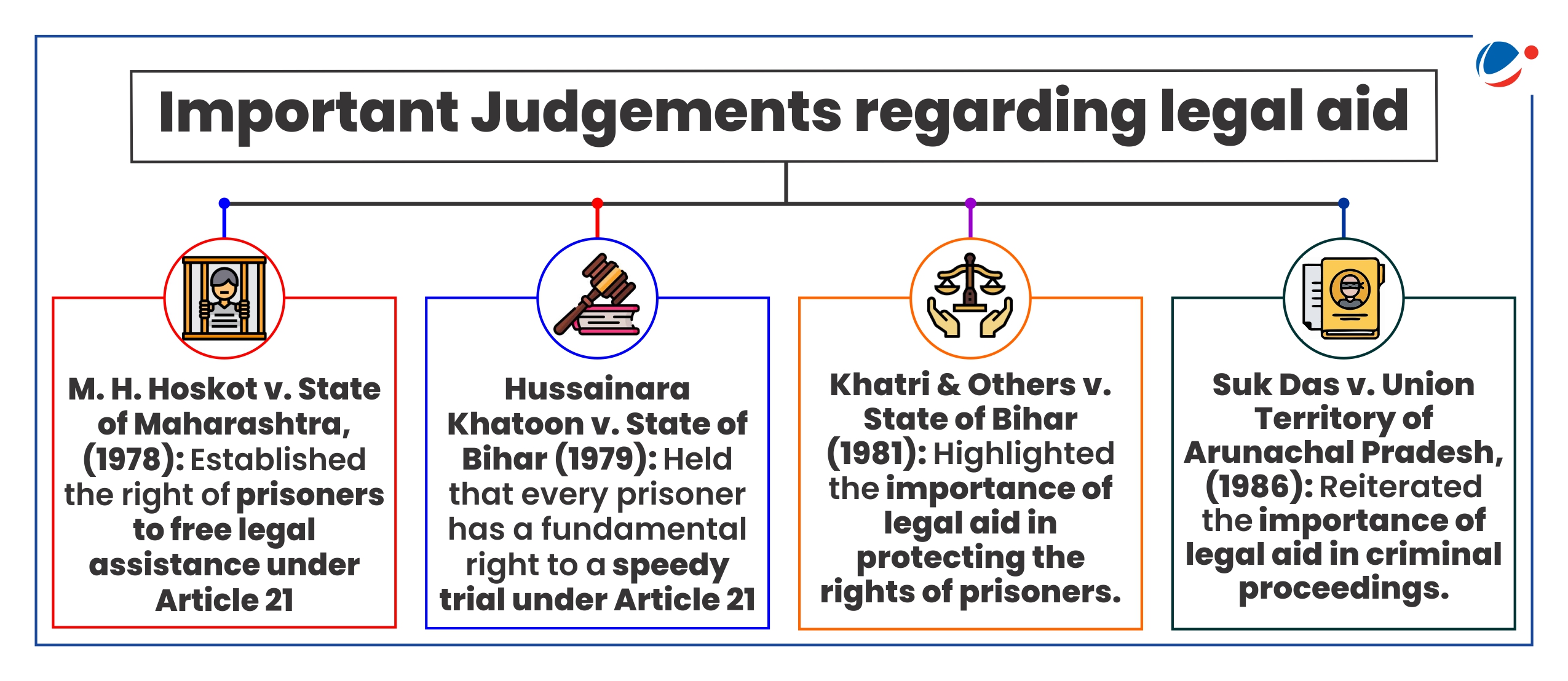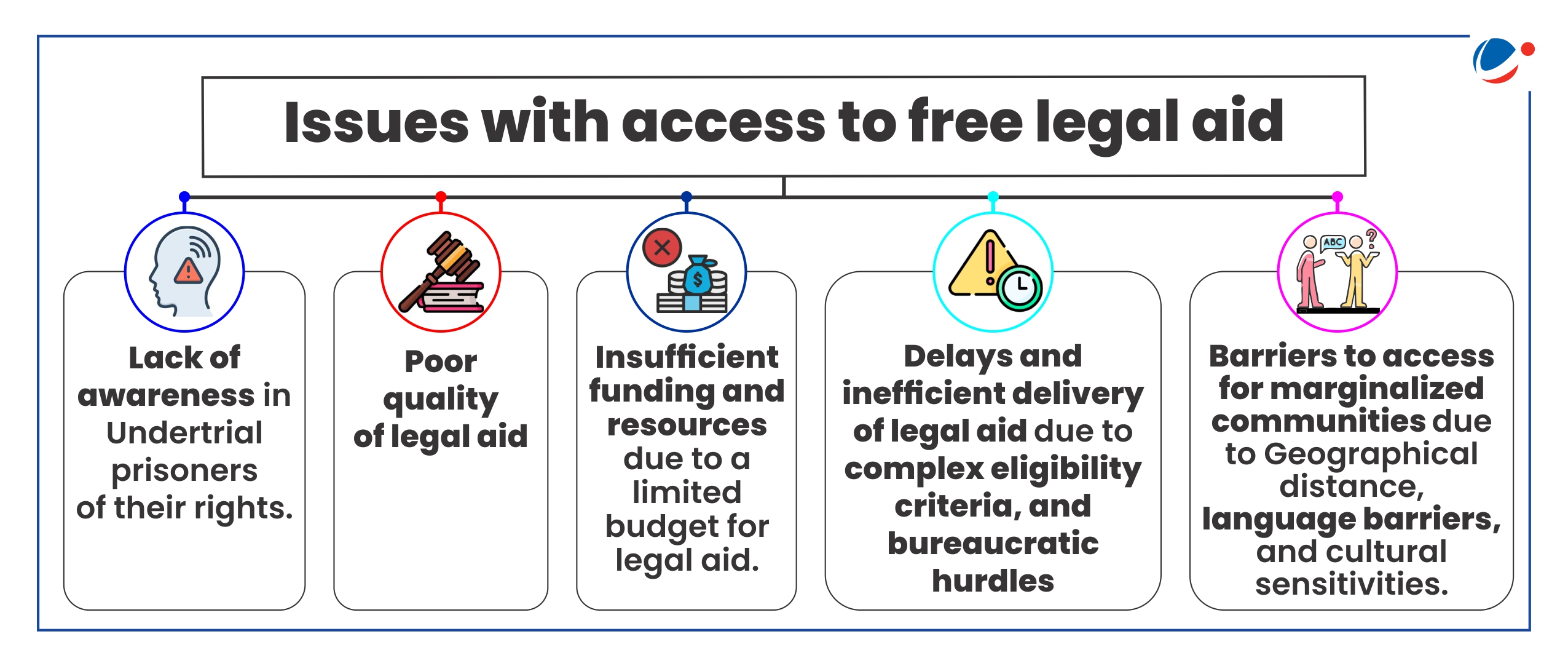Why in the news?
The Supreme Court (SC) issued directions for Legal Services Authorities (LSAs) to ensure access to free legal aid for prison inmates.
SC Directions to ensure access to free legal aid for prison inmates
- Strengthening Legal Services Authorities: The National Legal Services Authority (NALSA) in cooperation with the state and district level legal authorities shall ensure effective implementation of SOP-2022 with periodic upgradation.
- Strengthen the monitoring of Prisoner Legal Aid Clinics (PLACs): Periodic review of the functioning of the PLACs by the Legal Services Authorities (LSAs).
- Data-led improvements: The LSAs to periodically update statistical data and address the shortcomings highlighted on the analysis of this data.
- Legal Aid Defence Counsels: Periodic inspection and audit of the work of the Legal Aid Defence Counsels should be carried out.
- Awareness generation: Improving awareness about available schemes and legal aid services including literature in local languages and employing appropriate promotional methods.
- Effective Communication: Periodic interaction by the LSAs with convicts as well as Jail Visiting Lawyers (JVLs) and Para Legal Volunteers (PLVs).
- The High Courts may on their webpage carry information about the legal aid facilities available in the State.
- Periodic reporting: Periodic reports should be submitted by the DLSAs to the SLSAs and the SLSAs to the NALSA and the process can be digitized for ease of access.

About free legal aid in India
- Legal aid in India refers to the provision of free legal services to individuals who are unable to afford legal representation or access to the justice system.
- Legal aid can include legal advice, representation in court proceedings, mediation, negotiation, and alternative dispute resolution mechanisms.
- Constitutional provisions for legal aid
- Article 21: It states that no person shall be deprived of his life or personal liberty except according to procedure established by law.
- Article 39-A: Ensure 'Equal Justice and Free Legal Aid' to ensure that opportunities for securing justice are not denied to any citizen because of economic or other disabilities, inserted by the 42nd Constitutional Amendment (1976).
- Statutory provisions
- Legal Services Authorities Act, 1987 (came into force in 1995): To constitute legal services authorities to provide free and competent legal services to the weaker sections of society.
- National Legal Services Authority (NALSA), State Legal Services Authority (SLSAs) and the District Legal Services Authority (DLSAs) were accordingly constituted.
- Section 341 of the Bhartiya Nagarik Suraksha Sanhita, 2023: Legal aid to accused at State expense in certain cases where the accused lacks the means for legal engagement.
- Legal Services Authorities Act, 1987 (came into force in 1995): To constitute legal services authorities to provide free and competent legal services to the weaker sections of society.
The National Legal Services Authority (NALSA)
|
Significance of free legal aid
- Social welfare and justice: It aids in addressing systemic inequalities and empowering marginalised communities by enabling them to challenge discriminatory practices.
- It helps to bridge the gap between the rights guaranteed by law and the ability of individuals to enforce those rights.
- Protection of rights: Legal aid plays a crucial role in protecting and promoting fundamental rights and liberties, including the right to a fair trial, the right to equality before law, the right to legal representation, and the right to access to courts.
- Strengthening rule of law: Legal assistance promotes adherence to legal norms and procedures, thereby, enhances public trust and confidence in the justice system.
- Legal awareness: Legal aid provides both representation and education about the legal rights to people.

Government Steps
|
Way forward
- Policy implementation: Policies should focus on increasing funding for legal aid, simplifying eligibility criteria, and improving coordination between different stakeholders.
- Strengthening institutional capacity: Building capacities of LSAs, enhancing infrastructure and resources and strengthening monitoring and evaluation mechanisms.
- Awareness generation: For example, Haq Humara bhi toh hai@75 campaign in 2022 for providing basic legal assistance to persons confined in prisons and children in child care institutions.
- Leveraging Technology: To enable solutions to expand the reach and efficiency of legal aid services.
- Prison records can be made available digitally for ease of access for providing effective legal aid by the courts.
- Quality legal aid: A threshold level of competence and due diligence in the discharge of his duties as a defence counsel to be ensured. (Ramanand@ Nandlal Bharti v. State of U.P., 2022)
Related news: SARTHIE 1.0The Department of Social Justice and Empowerment (DoSJE) and National Legal Services Authority (NALSA) launched SARTHIE 1.0. About SARTHIE 1.0
|






